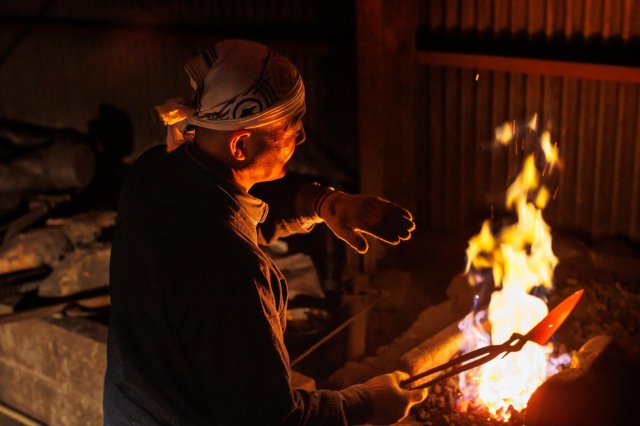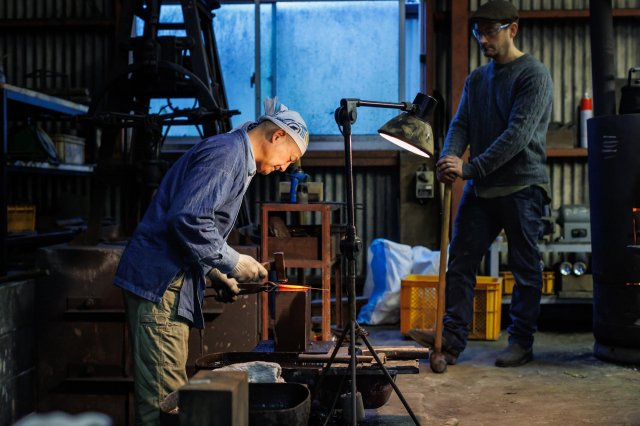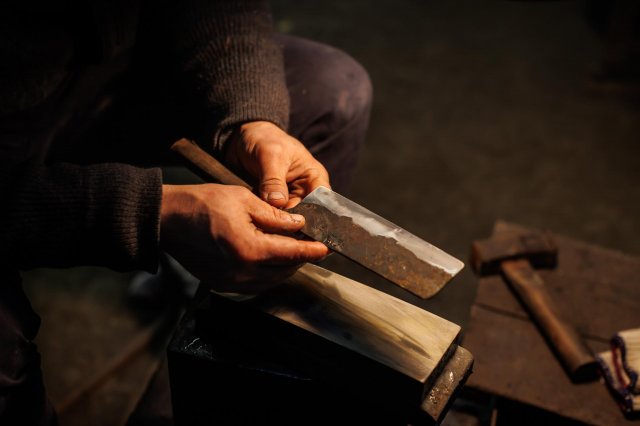- 2024.02.29
-
Inside the mind of a Japanese blacksmith
“From physical strength while working the resilient steel, to extreme dexterity when polishing and fine-tuning the knife, the work of a blacksmith requires diverse skills. However, there is a common element in every process, which I think is the most difficult to master. And that has to do with intuition. Meaning, remembering by body, and not by mind.”
“As an example, there is a process called yaki-ire where we harden the knife through intense heating and immediate cooling. As I expose the knife to a blazing fire, I have to monitor the temperature of the metal with my eyes, based on the exact hue of its lava-red color. The timing and duration with which I immediately cool the heated knife in water also has to be exact–not a second shorter or longer–otherwise, it can split in two. This process still makes me nervous because there’s no room for error, but it’s arguably the most important.”
“Within the context of forging Japanese katana (swords), this step is traditionally described as “giving the blade a soul.” Just like that, whether you’re specialized in crafting Japanese kitchen knives and smaller bladed tools like me, or katana swords (which today, requires a special permit through rigorous training), the centuries-long history of forging in Japan–at its very core–comes down to training and trusting a feeling that relies less on logic, and more on heart.”
Among the majestic Kochi mountains, Nobuya Hayashi (@nobuyah) practices an ancient forging technique that dates back over 1,500 years. At Workshop Kurogane (@たたら製鉄古式鍛造工房くろがね workshop Kurogane) located along the crystal-clear Shimanto River, he offers visitors the opportunity to forge their own one-of-a-kind knife. You can also order custom knives online (domestic and international shipping available)
Read Mr. Hayashi’s full story here: https://www.facebook.com/visitkochijapan/posts/pfbid02XQpfKSn4JwG42tKiBPVNgdApmrgB4TrBzBgqUXV8NETLCGAoG8XXWMmq91mx4WRGl
Workshop Kurogane
https://maps.app.goo.gl/Jb9E4HR1AMeiJfqy7
https://visitkochijapan.com/en/activities/10159
“As an example, there is a process called yaki-ire where we harden the knife through intense heating and immediate cooling. As I expose the knife to a blazing fire, I have to monitor the temperature of the metal with my eyes, based on the exact hue of its lava-red color. The timing and duration with which I immediately cool the heated knife in water also has to be exact–not a second shorter or longer–otherwise, it can split in two. This process still makes me nervous because there’s no room for error, but it’s arguably the most important.”
“Within the context of forging Japanese katana (swords), this step is traditionally described as “giving the blade a soul.” Just like that, whether you’re specialized in crafting Japanese kitchen knives and smaller bladed tools like me, or katana swords (which today, requires a special permit through rigorous training), the centuries-long history of forging in Japan–at its very core–comes down to training and trusting a feeling that relies less on logic, and more on heart.”
Among the majestic Kochi mountains, Nobuya Hayashi (@nobuyah) practices an ancient forging technique that dates back over 1,500 years. At Workshop Kurogane (@たたら製鉄古式鍛造工房くろがね workshop Kurogane) located along the crystal-clear Shimanto River, he offers visitors the opportunity to forge their own one-of-a-kind knife. You can also order custom knives online (domestic and international shipping available)
Read Mr. Hayashi’s full story here: https://www.facebook.com/visitkochijapan/posts/pfbid02XQpfKSn4JwG42tKiBPVNgdApmrgB4TrBzBgqUXV8NETLCGAoG8XXWMmq91mx4WRGl
Workshop Kurogane
https://maps.app.goo.gl/Jb9E4HR1AMeiJfqy7
https://visitkochijapan.com/en/activities/10159


